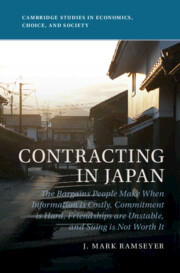 Contracting in Japan
Contracting in Japan Book contents
- Contracting in Japan
- Cambridge Studies in Economics, Choice, and Society
- Contracting in Japan
- Copyright page
- Dedication
- Contents
- Acknowledgments
- 1 Introduction
- 2 Contracting for Terroir in Sake
- 3 Contracting for Quality in Fish
- 4 Contracting for Geothermal in Hot Springs
- 5 Contracting for Credit in Agriculture
- 6 Contracting for Mercy in Buddhism
- 7 Conclusions
- Bibliography
- Index
6 - Contracting for Mercy in Buddhism
Published online by Cambridge University Press: 10 August 2023
- Contracting in Japan
- Cambridge Studies in Economics, Choice, and Society
- Contracting in Japan
- Copyright page
- Dedication
- Contents
- Acknowledgments
- 1 Introduction
- 2 Contracting for Terroir in Sake
- 3 Contracting for Quality in Fish
- 4 Contracting for Geothermal in Hot Springs
- 5 Contracting for Credit in Agriculture
- 6 Contracting for Mercy in Buddhism
- 7 Conclusions
- Bibliography
- Index
Summary
Young would-be farmers in pre-war Japan needed land to till. They could borrow the money to buy it from banks, but the out-of-town staff at the banks lacked much information about who would make the best farmers. Alternatively, they could borrow from wealthy local families. These local elites knew the area and the people. Embedded in the network of community social ties, they knew which farmers were most conscientious and which lands were most productive. Should a farmer consider reneging on a contract, they had access to the networks that would collectively impose the sanctions necessary to encourage compliance. Although these local elites lacked the university education necessary to document court-enforceable security interests, leases let them advance the funds without elaborate documentation. Rather than lend the farmer the money and have him buy the land, they bought the land (if they did not already own it) and leased it to the farmer. If the farmer failed to pay, the investor evicted him from the land and moved on.
- Type
- Chapter
- Information
- Contracting in JapanThe Bargains People Make When Information is Costly, Commitment is Hard, Friendships are Unstable, and Suing is Not Worth It, pp. 162 - 186Publisher: Cambridge University PressPrint publication year: 2023


